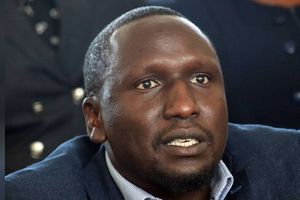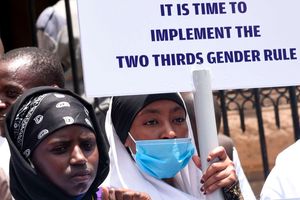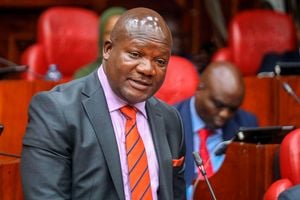
Kibwezi West MP Mutuse Mwengi tabling his impeachment motion against Deputy President Rigathi Gachagua at the National Assembly in Nairobi on October 8, 2024.
A parliamentary committee has rejected President William Ruto’s proposal to initiate an amendment to the Constitution and create the office of the leader of opposition.
The Members of Parliament (MPs) said such a move will undermine the system of government in Kenya having adopted a pure presidential system.
And some of the members of the Justice and Legal Affairs Committee (JLAC), especially those from Mr Raila Odinga’s ODM party, also rejected a proposal to amend the Constitution to create the office of Prime Minister.
They argued that the Premier office does not also fit the existing governance structure and will “likely” clash with the office of the Deputy President.
However, the committee was unanimous that creation of the office of the leader of opposition, which President Ruto proposed in a memorandum to Parliament in December 2022, conflicted with the presidential system of government.
“The system of governance is a presidential system. Article 108 of the constitution provides for party leaders in the National Assembly to include the leader of a minority party who is essentially the leader of the opposition in parliament,” JLAC, chaired by Tharaka MP George Murugara recommends in the report before the House.
“Therefore, introducing the office of the leader of opposition profoundly alters the functions of parliament,” the JLAC report adds.
These recommendations are contained in a JLAC report tabled in the National Assembly on October 9 following the consideration of the National Dialogue Committee (Nadco) report submitted early in the year.
Nadco was co-chaired by Wiper leader Kalonzo Musyoka and leader of majority in the National Assembly Kimani Ichung’wah.
A majority of JLAC members did not have a problem establishing the Office of Prime Minister but proposed a name change to ‘Prime Cabinet Secretary’ to conform to the constitution.
“The term ‘Minister’ used in the proposal does not exist in the constitution and should therefore be substituted with ‘Cabinet Secretary’ and the office should be domiciled in Article 152 of the constitution,” the committee recommended.
However, committee members Dr Otiende Amollo (Rarieda), a known Odinga ally and John Makali (Kanduyi) recorded their dissenting views on the proposal.
“There is no need for the proposed office of Prime Minister. The mischief the proposal seeks to cure is not clearly established. Furthermore, the office of the Prime Minister does not fit the existing governance structure,” the minority report says.
Dr Amollo and Mr Makali also noted that the office of Prime Minister will “likely” result in a conflict or clash with the office of the Deputy President and therefore “unnecessarily result in a bloated wage bill, a matter of concern to Kenyans given the current difficult economic times.”
In the December 2022 memorandum to parliament, President Ruto requested parliament to initiate among others, the process to establish the office of the leader of opposition and two deputies.
The establishment of the office, the president argued, was to ensure inclusivity and cohesion after general elections and prevent political instability caused by the winner-takes-it-all system.
The president’s memorandum was considered by the Nadco team, which recommended the creation of the office of opposition leader.
“The system of governance is a presidential system. Article 108 of the constitution provides for party leaders in the National Assembly to include the leader of a minority party who is essentially the leader of the opposition in parliament,” JLAC, chaired by Tharaka MP George Murugara recommends in the report before the House.
Nadco was formed following a wave of deadly protests instigated by Azimio leader Raila Odinga’s rejection of the outcome of the August 9, 2022 general election and his subsequent failure to recognize President Ruto as validly elected.
In the memorandum, President Ruto proposed that the person who garnered the second largest number of votes at the presidential election, be appointed the leader of opposition, an office to be funded by the taxpayer.
Deepening democracy
President Ruto’s initiative was shared by his Kenya Kwanza Alliance in its submissions to the Nadco team. Kenya Kwanza noted that the Constitution “fell short of providing similar clarity on the full post-election fate of the minority side.”
“The office was important in promoting inclusivity, strengthening oversight, deepening democracy, and alleviating perennial problems experienced in every electoral cycle,” Kenya Kwanza said.
The Kenya Kwanza alliance proposed that Parliament come up with a law to establish the office “who will sit in the National Assembly so that they can oversee the government.”
However, JLAC observed that the proposal to entrench the office of the leader of opposition in the constitution “fundamentally relates to the supremacy of the constitution, sovereignty of the people hence requires a referendum.”
“It was the committee’s view that such a proposal must be subjected to a referendum as there is no clear institutional framework for the office of the leader of opposition,” the committee said.
The Murugara-led committee further noted that it is not clearly provided whether the office will be a public or state office and in which arm of government it will be domiciled.
The Committee of Experts (CoEs) that drafted the current constitution had recommended a parliamentary system of government before its views were shredded by an ad hoc committee of parliament.
The CoE had argued in its report on constitutional review that a parliamentary system “is more inclusive.”
In its report, JLAC noted that the constitution does not envisage a member of the executive sitting in parliament as implied in the proposed Nadco report as “this will result in a change in the system of government, a decision reserved for the people.”
Submitting its views to the Nadco team, Mr Odinga’s Azimio coalition noted that the office of the leader of opposition could be domiciled in Parliament as is the case with the Westminster Parliamentary system of government in the United Kingdom (UK).
Azimio noted that the creation of such an office would require a referendum and proposed the replacement of the current system led by a powerful presidency with the national consensus arrived at the national constitution conference.
Azimio submitted that the National Assembly will also have the leader of opposition to provide checks and balances and also alternative policies and that the proposed system will replace the winner-takes-all system.
“Azimio averred that the proposed system will require a constitutional amendment through a referendum. Acknowledging the current difficult economic times, Azimio was willing to wait for an opportune moment, when the economic situation in the country permits, for such a referendum to be held,” the Nadco report says.
The Law Society of Kenya (LSK) while submitting its views to the Nadco team, did not support the establishment of the office of leader of opposition, “unless it is established in such a manner that conforms to the constitution.”
According to then LSK President Eric Theuri, establishment of the office of leader of opposition will require the country to make a distinction of whether to go the pure Presidential or Parliamentary route or a hybrid of the two systems.
“The creation of such an office would require an entire overhaul of the system of governance and would raise the questions of the basic structure of the constitution as was the case in the Building Bridges Initiative,” said Mr Theuri.
It was the view of LSK that this was not the route the country was prepared to go in light of the challenges it was seeking to address and could create more disharmony.











